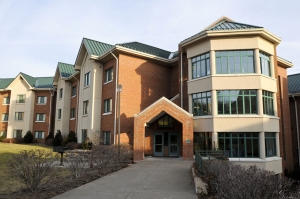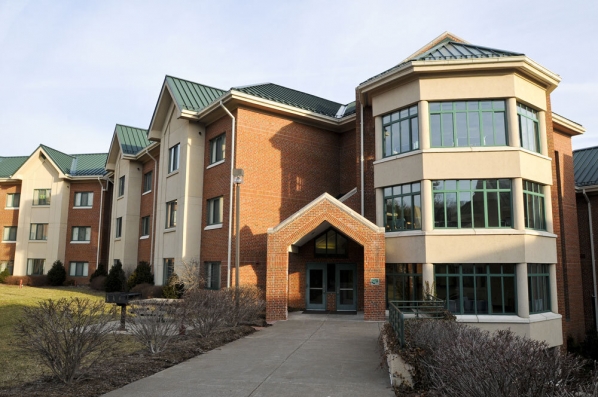On Oct. 17, App State’s Water and Steam Systems Engineer was notified by the North Carolina Dept of Environmental Quality about elevated levels of haloacetic acids (HAA5s), in four university buildings after a regular quarterly water quality test on Oct. 8, 2024:
- Appalachian Heights
- Student Recreation Center
- Trivette Hall
- Convocation Center
Per state requirements, this information was physically posted to the four buildings earlier today.
With significant silt levels in groundwater, lakes, rivers and streams across Western NC, the university engaged in a standard mitigation process during which the university’s water system was treated with chlorination chemicals in order to make it safe to drink and use for personal hygiene.
A byproduct of the chlorination process is HAA5s, which are not harmful in small, periodic quantities, and are not linked to skin infections.
Although the university tap water is safe to drink, we are providing bottled water to all residence halls, which can be picked up at Central Dining Hall during regular operating hours. Activated carbon filters have been shown to be effective at reducing HAA5 level in tap water. Filters in campus water bottle filling stations, which are located in buildings throughout campus, including residence halls, are changed several times throughout each semester.
Since Oct. 8, when the water was last tested, the university has been actively flushing its water system. We will continue regular testing and mitigation measures until test results from NCDEQ show acceptable levels.
Test results will be posted at facilitiesoperations.appstate.edu as they are updated.
Below please find information provided to the university by AppHealthCare, our local public health agency:
INFORMATION ABOUT YOUR APPALACHIAN STATE UNIVERSITY WATER SYSTEM TESTING
On October 8, 2024 Appalachian State University performed regular quarterly water testing of its public water system. The test results came back on October 17, 2024 and indicated levels of haloacetic acids (HAA5s) exceeding allowable limits.
HAA5s are disinfection by-products which are formed when chlorine is added to water to kill bacteria and other pathogenic microorganisms. The increased presence of HAA5s in this case stems from sanitizing the university’s water following Hurricane Helene.
What should I do?
- Appalachian State University has consulted with AppHealthCare, your local public health agency, which has confirmed that at this time, no alternative source of water is necessary.
- If a situation arises where the water is no longer safe to drink, you will be promptly notified.
- You do not need to boil your water or take other corrective actions.
- HAA5s are not bacterial, viral, or fungal, it is a disinfection process byproduct. However, if you have specific health concerns, have a severely compromised immune system, have an infant, are pregnant, or are elderly, you may wish to seek advice from your health care provider about drinking this water.
- If you do not feel comfortable drinking the water, the university is providing bottled water. Activated carbon filters (e.g. Brita and other comparable filters) have been shown to be effective at reducing HAA5 level in tap water.
What does this mean?
This is not an emergency. If it had been, you would have been notified. When disinfectants are used in the treatment of drinking water, they react with naturally occurring organic and inorganic matter and can produce HAA5s. Some people who drink water containing haloacetic acids in excess of the allowable limits over many years may have an increased risk of getting cancer.
What is being done?
In consultation with regulatory agencies, Appalachian State University is actively taking steps to ensure the water quality returns to allowable levels. This includes flushing the water system. Appalachian State University will continue to work with regulators on mitigation efforts until the HAA5s are below an allowable level.

